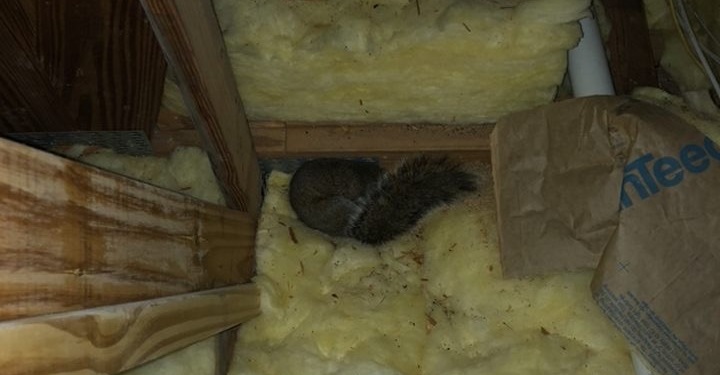
It can be fun to watch squirrels on your property scurrying from tree to tree, collecting food, storing food, and preparing for winter months. When sitting outdoors, the noises squirrels make remind you of how amazing nature can be. However, when squirrels invade your personal space, they become a nuisance.
When it gets cold outdoors, squirrels search for a warm living space. Some create lavish nests in trees, and others find a way into your attic, crawlspace, chimney, ceilings, or walls. If you have a squirrel living in your home, you will know it by its noises.
The most common complaint homeowners have about squirrels is their noise. Just about everything a squirrel does creates noise. Although squirrels are primarily active during the day, that doesn’t mean you won’t hear them at night, too, especially flying squirrels.
When and Where Do Squirrels Make Noise?
Squirrels are busiest in the early morning and evening. They usually sleep all night but become active when the sun rises. If they live in your home, they go outdoors to search for food and nesting materials, which they then bring inside.
You may hear them scurrying around the home, leaving and reentering, possibly dragging twigs, leaves, or other items to store nearby. Expect squirrel sounds in your attic, roof, ceiling, and walls.
What Vocal Noises Do Squirrels Make?
Squirrels can make a wide range of vocalizations. Depending on their activity, you may hear a squirrel producing a high-pitched chirp when they get excited. They also bark when they feel threatened and whistle when they feel happy. To communicate with other squirrels, they make chattering noises.
Eastern gray squirrels are specifically known for their chattering. Red squirrels also chatter but have a high-pitched sound. Fox squirrels are different in that their vocalizations are lower pitched.
What Movement Noises Do Squirrels Make?
Squirrels chew and gnaw on electrical wires, wood beams, drywall, siding, shingles, and plastic. If you hear noises in your attic, walls, or ceiling, it could be due to a squirrel. Movement noises to listen for include the patter of feet, running, scurrying, shuffling, scratching, and tapping.
All the noises will be amplified if multiple squirrels live in your home. One squirrel running across the floor will be a light sound, but five squirrels running may sound more like galloping.
Squirrel Noises in the Attic
Depending on how many there are, you may hear multiple squirrel sounds in the attic, including the following:
- Scratching on drywall, insulation, ducts, vents, and wood beams
- Crumpling of paper or other materials being stored in the attic
- Acorns and other nuts roll across the floor
- Dragging of nesting materials
- Digging in one spot, like insulation or drywall
Squirrel Noises in the Walls
Scurrying is the most common noise you will hear from squirrels. Other squirrel sounds in walls include tapping, chewing, gnawing, and scratching. You may also hear a squirrel build or add to its nest, including crumpling or breaking twigs, papers, and leaves.
Squirrel Noises on the Roof
Squirrel sounds on the roof vary depending on the task it is working on. They spend a lot of time on the roof, running back and forth, bringing their findings of the day to various hiding spots. They jump from trees to the roof, run up the side of your home, or jump from electrical lines hanging above your roof.
Comparing Sounds in the House
Knowing the various sounds a squirrel makes is essential to understanding its actions. Below are the most common noises a squirrel makes:
- Chatter sounds like clicking and squeaking, signaling squirrels are communicating.
- Squirrels use high-pitched screams or screeches to alert other squirrels of danger.
- Deep, guttural barks are a squirrel’s way of protecting their territory but may also be part of a mating ritual.
- Mating calls are not just barks; they may also include trills and whistles and can sound musical.
Squirrel Signs vs. Rat Sounds
Squirrels are most active in the early mornings and late evenings. Rats are most active at night or when the home is quiet. The vocalization and movement sounds squirrels and rats make are very similar. They are rodents and like to gnaw, chew, scratch, and scurry. Rats and squirrels build nests in attics, walls, and ceilings, but rats will enter other parts of your home. For example, rats get into pantries, pet food bags, trash cans, and anywhere else they can find food. It is likely a rat if you hear noises coming from those areas.
Squirrel Sounds vs. Raccoon Sounds
Raccoons are much larger than squirrels, and their noises are louder. Raccoons move much slower than squirrels and often make a rustling sound when moving around in your attic. They have over 200 vocalizations, including purring, hissing, growling, snarling, and whimpering. They can even screech like owls.
Squirrel Sounds vs. Bat Sounds
Squirrels are much easier to hear than bats, which are only active at night and make little noise as they fly in and out of your attic. Occasionally, you may hear squeaking sounds, especially if a colony of bats is living in your home. If you are outside after dark, you may hear bats flying to capture insects, including flapping their wings.
Other Squirrel Nuisance Concerns
Sounds and noises are just one concern of having squirrels living in your home. They chew through vents, pipes, ducts, wood, drywall, and siding. They build nests in chimneys, open pipes, insulation, and ductwork, causing your HVAC systems to malfunction and utility bills to rise.
Squirrels drag materials onto your roof, cluttering gutters. They also chew through siding and shingles, causing leaks and drainage problems.
Anyone with citrus or other fruit trees, gardens, or crops can expect damage from squirrels.
Squirrels harbor bacteria and diseases they can transmit to humans, including the following:
- Lyme disease
- Salmonellosis
- Parasites
- Leptospirosis
- Tularemia
- Rabies
- Ringworm
- Squirrel pox
How To Stop Squirrel Noises in Your House
The most crucial way to stop squirrel noises in your house is to eliminate all access points. Squirrels can squeeze through a hole as small as three inches. If they can fit their head through the hole, they can get the rest of their body through.
Sealing entry points is one of many exclusion methods to help stop squirrel noises in your house. Contacting a wildlife control professional is recommended. They have the knowledge, experience, and equipment to keep you and the squirrel safe.
Find an Critter Control near you
Get them out.
Keep them out.®
Experiencing a wildlife or pest issue? We can help! Complete this form and your local Critter Control® office will contact you to assist.
- How to Get Rid of Squirrels
- Squirrels Entering Homes
- Squirrels in Attics
- Squirrels in Chimneys
- Squirrels on Roofs & in Soffits
- Squirrels in Walls
- Squirrels in Ventilation
- Squirrels in Gutters
- Squirrels in Crawl Spaces
- Squirrels in Yards or Gardens
- Squirrels in Trees
- Squirrels Digging Holes in the Ground
- Squirrel Tracks
- Squirrel Droppings
- Squirrel Trapping
- Squirrel Repellents & Deterrents
- Squirrel Appearance & Identification
- Species & Types of Squirrels
- Squirrel Life Cycle
- Baby Squirrels
- Squirrel Nest
- Dead Squirrels
- Squirrel Diet
- Diseases That Squirrels Carry
- Rabid Squirrels
- Do Squirrels Hibernate?
- Gray Squirrels
- Do Squirrels Bite?
- Squirrel Damage to Your House
- Squirrels vs. Rats
- Squirrels vs. Chipmunks
